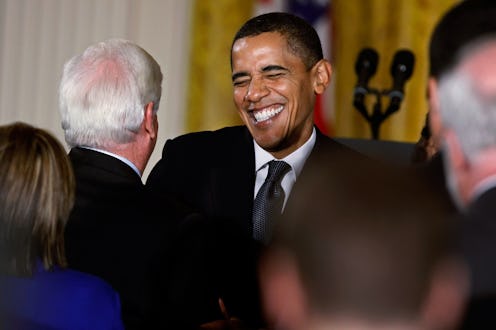News
The Shutdown's Over: Why the GOP (Epically) Failed
The Republican Party’s morbidly-fascinating campaign of focused self-destruction is nearing completion Wednesday evening, as Congress passed legislation to re-open and fund the government, raise the debt ceiling, and leave Obamacare unscathed. The bill contains absolutely nothing from the various ransom notes issued by conservative House Republicans throughout the shutdown; the Affordable Care Act emerges almost entirely unchanged, and the one modification that is in the bill actually strengthens the law and could actually help insulate it from future attacks. All in all, it’s an unequivocal, embarrassing defeat for Republicans, and one which was wholly avoidable.
President Obama noted that he would sign the bill as soon as it appeared on his desk, and that the government would re-open "immediately."
"There’s a lot of work ahead of us, including our need to earn back the trust of the American people that’s been lost over the last few weeks,” he said. "And we can begin to do that by addressing the real issues that they care about."
Majority Leader Harry Reid and Minority Leader Mitch McConnell announced the bill on the Senate floor Wednesday morning; the Senate voted 81-18 to pass it hours later, and the House passed it on a 285-144 vote hours after that. It raises the debt ceiling until Feb. 7 and funds the government until Jan. 15, delivers back pay to workers furloughed during the shutdown, creates a non-binding budget committee destined to go nowhere, and institutes an income verification system for recipients of Obamacare subsidies.
This last bit is the closest things Republicans can claim to a victory, but it’s woefully short of what the GOP’s suicide caucus hoped to achieve when they jumped into this fire two weeks ago. Enhanced income verification doesn’t at all hinder the framework or functioning of the Affordable Care Act; one could argue that it improves the law, as it makes it harder to cheat and, in doing so, makes it more cost-efficient. That seems like the kind of improvement President Obama had in mind when he said, many times throughout this process, that he’d be willing to work with Republicans to make the law better. This probably isn’t how he’d hoped to get that cooperation, but hey, bipartisanship is bipartisanship, even if it only happens under the threat of global economic destruction.
Reid and McConnell had started negotiating mid-day Tuesday, then abruptly stopped to give House Speaker John Boehner a chance to craft a bill of his own, because a) Boehner had apparently failed an insufficient number of times so far at doing so, and b) House Republicans were insisting that the bill originate in the House — probably in a panicked, delusional attempt to convince themselves that they had some control over the situation.
But they didn’t. Boehner crafted a bill, and even scheduled it for a vote, but alas, couldn’t rally his troops around it and yanked it from the legislative schedule. So, McConnell and Reid resumed their negotiations, and had a finished proposal by morning.
Some were concerned, not unreasonably, that Ted Cruz might have tried and block the bill in the Senate, but he’s ruled that out, explaining — with absolutely no irony whatsoever — that “delaying this vote would not accomplish anything.” Apparently that logic didn’t hold two weeks ago, unless Cruz considers obliteration of the Republican brand an accomplishment.
In passing the bill, Boehner had to do the one thing he'd been dreading this entire time, and that’s rely on House Democrats. Only 85 of 232 Republicans voted aye, while 198 of 200 Democrats did. Note that relying on Democratic support to pass the bill — also known as breaking the Hastert Rule — is something Boehner could well have done on September 30th, which would have avoided this entire episode. The speaker, who earlier slammed Democrats for treating the shutdown as "some damned game," responded to news of his impending surrender by saying that "we just didn't win."
The magnitude of Republicans’ miscalculation on this can’t be overstated. Had the House funded the government on September 30th, the last two weeks of news would have been dominated by the rollout of Obamacare, which has been disastrous. This would have lent credence to the Republican Party’s longstanding opposition to the law, and would have likely created public support for a one-year delay.
But House Republicans waved bye-bye to that opportunity two weeks ago, convinced that Obama would ultimately fold and agree to scrap his signature legislative achievement. They were wrong, and instead, press coverage focused overwhelmingly on the shutdown, intra-GOP squabbling, and the possibility of a default. Having squandered their best possible chance of derailing the law, all Republicans have to show for it is record-low approval ratings, hundreds of thousands of pissed-off federal workers, and a public that likes Obamacare more than when this fiasco started.
